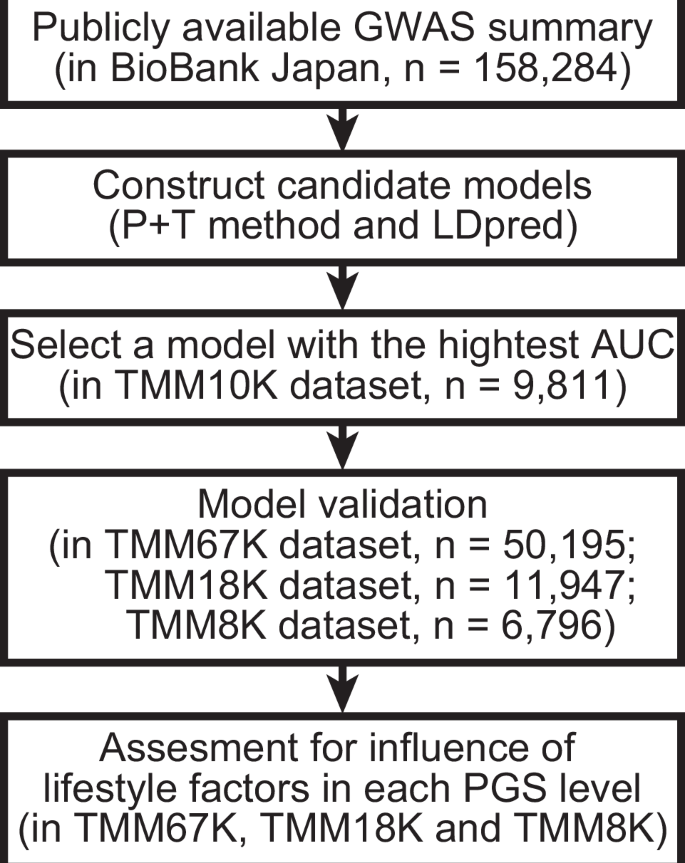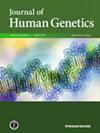健康生活方式与多基因高风险人群肥胖患病率下降相关:TMM社区队列研究。
IF 2.6
3区 生物学
Q2 GENETICS & HEREDITY
引用次数: 0
摘要
肥胖和超重是代谢综合征的基本组成部分,容易导致与生活方式相关的疾病。采用健康的生活方式能在多大程度上降低肥胖风险,即使是那些具有高遗传风险的人,这一点仍不确定。我们的目的是评估改变生活方式能在多基因评分(PGS)较高的肥胖症患者中改善预后的程度。我们利用多基因评分量化了肥胖的遗传风险。研究采用了来自东北医学巨型数据库社区队列(TMM CommCohort)的四个数据集。其中一个数据集(n = 9958)用于选择计算 PGS 的最佳模型。其余数据集(总 n = 69,341 个)用于荟萃分析,以验证模型并评估相关风险。与低PGS类别(第1-10位)相比,中PGS类别(数据集中第11-90百分位数)和高PGS类别(第91-100位)肥胖风险的几率比(OR)分别为2.27[95%置信区间:2.12-2.44]和4.83[4.45-5.25]。趋势分析表明,在所有遗传风险类别中,业余时间体育锻炼的增加与肥胖风险的降低有显著相关性,即使在高 PGS 类别中,OR 值也达到了 0.9 [0.87-0.94] 。同样,钠摄入量在所有遗传风险类别中都与肥胖呈正相关,在高 PGS 类别中,OR 值为 1.24 [1.17-1.31]。肥胖风险与采用健康的生活方式有关,即使在高 PGS 的个体中也是如此。我们的研究结果为将 PGS 纳入预防医学提供了新的视角。本文章由计算机程序翻译,如有差异,请以英文原文为准。


Healthy lifestyle practice correlates with decreased obesity prevalence in individuals with high polygenic risk: TMM CommCohort study
Obesity and overweight, fundamental components of the metabolic syndrome, predispose individuals to lifestyle-related diseases. The extent to which adopting healthy lifestyles can reduce obesity risk, even in those with a high genetic risk, remains uncertain. Our aim was to assess the extent to which lifestyle modifications can improve outcomes in individuals with a high polygenic score (PGS) for obesity. We quantified the genetic risk of obesity using PGSs. Four datasets from the Tohoku Medical Megabank Community-Based Cohort (TMM CommCohort) were employed in the study. One dataset (n = 9958) was used to select the best model for calculating PGS. The remaining datasets (total n = 69,341) were used in a meta-analysis to validate the model and to evaluate associated risks. The odds ratio (OR) for obesity risk in the intermediate (11th–90th percentiles in the dataset) and high PGS categories (91st–100th) was 2.27 [95% confidence intervals: 2.12–2.44] and 4.83 [4.45–5.25], respectively, compared to that in the low PGS category (1st–10th). Trend analysis showed that an increase in leisure-time physical activity was significantly associated with reduced obesity risk across all genetic risk categories, representing an OR of 0.9 [0.87–0.94] even among individuals in the high PGS category. Similarly, sodium intake displayed a positive association with obesity across all genetic risk categories, yielding an OR of 1.24 [1.17–1.31] in the high PGS category. The risk of obesity was linked to the adoption of healthy lifestyles, even in individuals with high PGS. Our results may provide perspectives for integrating PGSs into preventive medicine.
求助全文
通过发布文献求助,成功后即可免费获取论文全文。
去求助
来源期刊

Journal of Human Genetics
生物-遗传学
CiteScore
7.20
自引率
0.00%
发文量
101
审稿时长
4-8 weeks
期刊介绍:
The Journal of Human Genetics is an international journal publishing articles on human genetics, including medical genetics and human genome analysis. It covers all aspects of human genetics, including molecular genetics, clinical genetics, behavioral genetics, immunogenetics, pharmacogenomics, population genetics, functional genomics, epigenetics, genetic counseling and gene therapy.
Articles on the following areas are especially welcome: genetic factors of monogenic and complex disorders, genome-wide association studies, genetic epidemiology, cancer genetics, personal genomics, genotype-phenotype relationships and genome diversity.
 求助内容:
求助内容: 应助结果提醒方式:
应助结果提醒方式:


